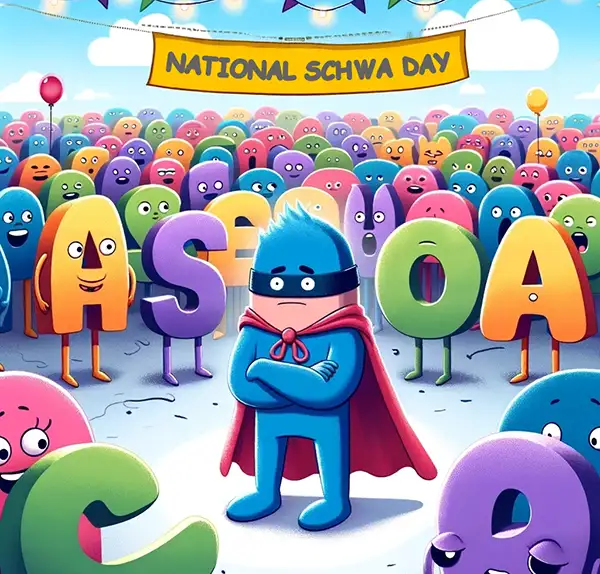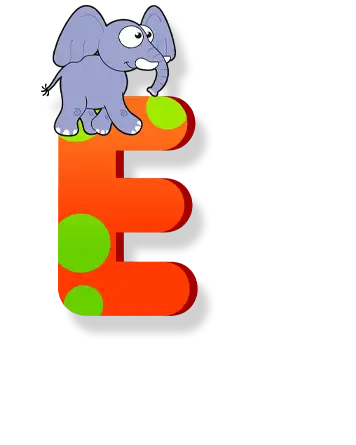Celebrate the Hero of the Alphabet
Get ready to not roll out the red carpet, because National Schwa Day is upon us! It’s the perfect occasion to honor the most overlooked and underappreciated vowel sound in the English language: the schwa. For those scratching their heads, the schwa is the ‘uh’ sound found in an abundance of English words, yet it somehow still flies under the radar.
Why does the schwa deserve its own day? Because without it, English pronunciation would be a clunky mess, filled with rigid, overly enunciated syllables that make us all sound like malfunctioning robots. The schwa is the linguistic grease that keeps our words flowing smoothly, the silent champion of unstressed syllables, and frankly, the chillest vowel sound in existence.
What is the Schwa, Anyway?
The schwa is that subtle yet ubiquitous 'uh' sound lurking in many English words' shadows. Technically, it's the most common vowel sound in English, appearing in a myriad of places, from the muted 'a' in 'sofa' to the stealthy 'e' in 'item'. Yet, despite its frequency, it manages to keep a low profile, making it the secret agent of the phonetic world.
This phonetic chameleon doesn’t get tied down to one letter; any vowel can represent it. It's the 'a' in 'about', the 'e' in 'taken', the 'i' in 'pencil', the 'o' in 'lemon', and the 'u' in 'supply'. The schwa is essentially the vowel equivalent of a utility player in baseball — not always the star, but always in the game, helping the team where needed.
 But why is the schwa so hard to pin down? Part of the mystery lies in its unassuming nature. It’s never stressed, always appearing in unstressed syllables, which allows it to slip past our ears mostly unnoticed. In many ways, the schwa is the backbone of English pronunciation; it helps maintain the rhythm and stress patterns of spoken English, ensuring that sentences flow smoothly.
But why is the schwa so hard to pin down? Part of the mystery lies in its unassuming nature. It’s never stressed, always appearing in unstressed syllables, which allows it to slip past our ears mostly unnoticed. In many ways, the schwa is the backbone of English pronunciation; it helps maintain the rhythm and stress patterns of spoken English, ensuring that sentences flow smoothly.
Celebrating the schwa is about more than just recognizing a sound — it's about appreciating the efficiency and flexibility it brings to the language. So next time you catch yourself uttering this humble sound, give a little nod to the schwa, the unsung hero of the English alphabet.
How to Schwa it Up
Sure, it’s not the flashiest holiday, but Schwa Day deserves some festivities. Here are some creative ways to honor the most relaxed vowel sound in the English language:
- Schwa Swap Game: Challenge your friends to replace as many vowel sounds as possible with a schwa in their everyday conversation. "Can I get a cəp of cəffee?" could become your new order at the café. It's not only a great party trick, but it will also confuse everyone around you — bonus!
- Schwa Sound-Off: Have a schwa pronunciation contest. Who can identify the most words with a schwa by ear? Spoiler: Everyone loses because who really notices the schwa?
- Dress Like a Schwa: This is tricky, as the schwa is not only silent but also invisible. So, really, just wear whatever you want and say you’re dressed as a schwa. It’s the perfect costume for introverts!
- Write a Poem in Schwa’s Honor: Create a short poetic tribute to the schwa. Extra points if you make it rhyme and sneak as many schwa-containing words as possible into your verse.
Schwa Facts
Before you go back to your regularly scheduled speech patterns, let’s take a moment to appreciate some fascinating schwa-related facts:
- It’s the Most Common Vowel Sound in English: Despite rarely getting any attention, the schwa appears in more words than any other vowel sound. Talk about being an underappreciated workhorse!
- It Helps Keep English Speech Fast and Efficient: Without the schwa, we’d have to carefully enunciate every vowel, which would make casual conversation sound like a dramatic Shakespearean monologue.
- It’s Found in Almost Every Language: While English might be obsessed with it, many other languages also use a version of the schwa, proving that lazy pronunciation is a global phenomenon.
- It’s the Only Vowel Sound with Its Own Symbol: The schwa is represented by the iconic upside-down 'e' (ə) in the International Phonetic Alphabet (IPA). It’s like a secret club that only linguists get excited about.
- It Can Be Any Vowel, But It’s Always Chilling in the Background: Unlike other vowels that demand attention, the schwa is happy to take the backseat, never stealing the limelight but always keeping the language running smoothly.
- It’s the Ultimate Shape-Shifter: Because it appears in unstressed syllables, its pronunciation can change depending on the word, making it one of the most flexible sounds in English.
Why We Should Appreciate the Schwa
The schwa might not be the most glamorous or celebrated vowel sound in English, but its contribution to the language is immense. Here’s why this underappreciated sound deserves a round of applause (or at least a polite nod):
- Efficiency in Speech: The schwa is a true workhorse in spoken English. It allows for the quick and fluid pronunciation of unstressed syllables, helping to speed up our speech while maintaining clarity.
- Linguistic Flexibility: The schwa's ability to appear as any vowel in unstressed positions adds a layer of flexibility to English pronunciation that many languages lack.
- Aids in Learning Pronunciation: For learners of English, understanding the role of the schwa can be a game-changer. It simplifies pronunciation and makes speech sound more natural.
- Phonetic Placeholder: The schwa serves as a sort of phonetic "placeholder" in many words, maintaining structure while letting stressed syllables stand out.
The schwa is the glue that holds English pronunciation together. It may not be the star of the show, but its role in the background is what allows the stars to shine. This National Schwa Day, let’s give it up for the schwa—because sometimes, the things we notice the least are what we need the most!
So this National Schwa Day, let's raise a glass (or just lazily lift it halfway) to the schwa. It may not be the vowel we always notice, but it’s definitely the vowel we need. Celebrate responsibly, and remember — when it comes to the schwa, less is more!
Please Share our Content






 But why is the schwa so hard to pin down? Part of the mystery lies in its unassuming nature. It’s never stressed, always appearing in unstressed syllables, which allows it to slip past our ears mostly unnoticed. In many ways, the schwa is the backbone of English pronunciation; it helps maintain the rhythm and stress patterns of spoken English, ensuring that sentences flow smoothly.
But why is the schwa so hard to pin down? Part of the mystery lies in its unassuming nature. It’s never stressed, always appearing in unstressed syllables, which allows it to slip past our ears mostly unnoticed. In many ways, the schwa is the backbone of English pronunciation; it helps maintain the rhythm and stress patterns of spoken English, ensuring that sentences flow smoothly.








 "Sláinte!" is a traditional Irish expression used as a toast, equivalent to "Cheers!" in English.
"Sláinte!" is a traditional Irish expression used as a toast, equivalent to "Cheers!" in English.